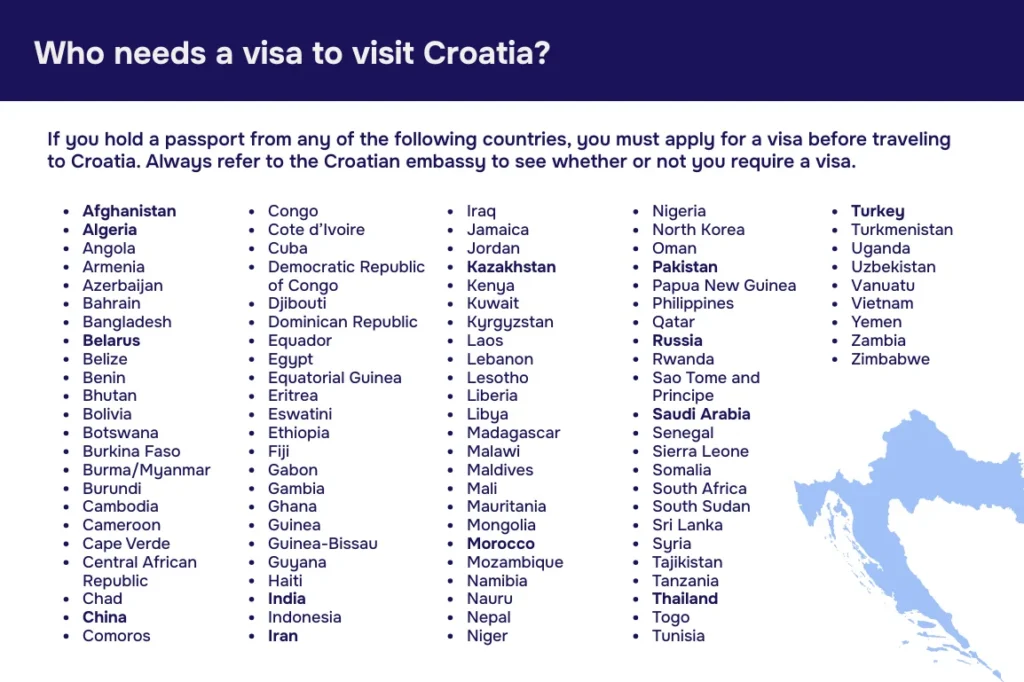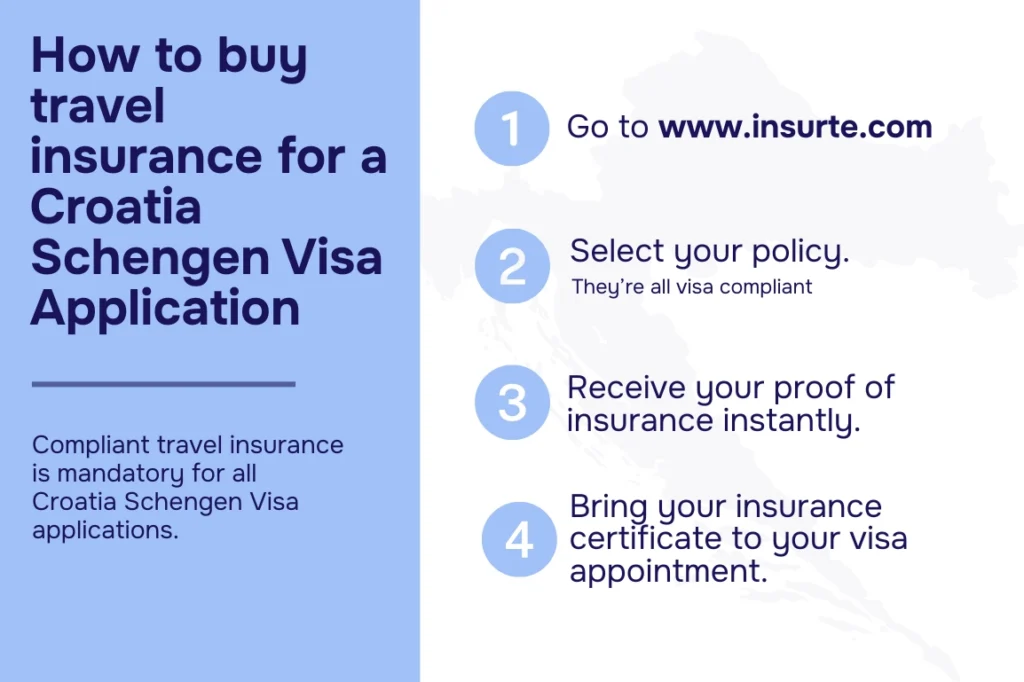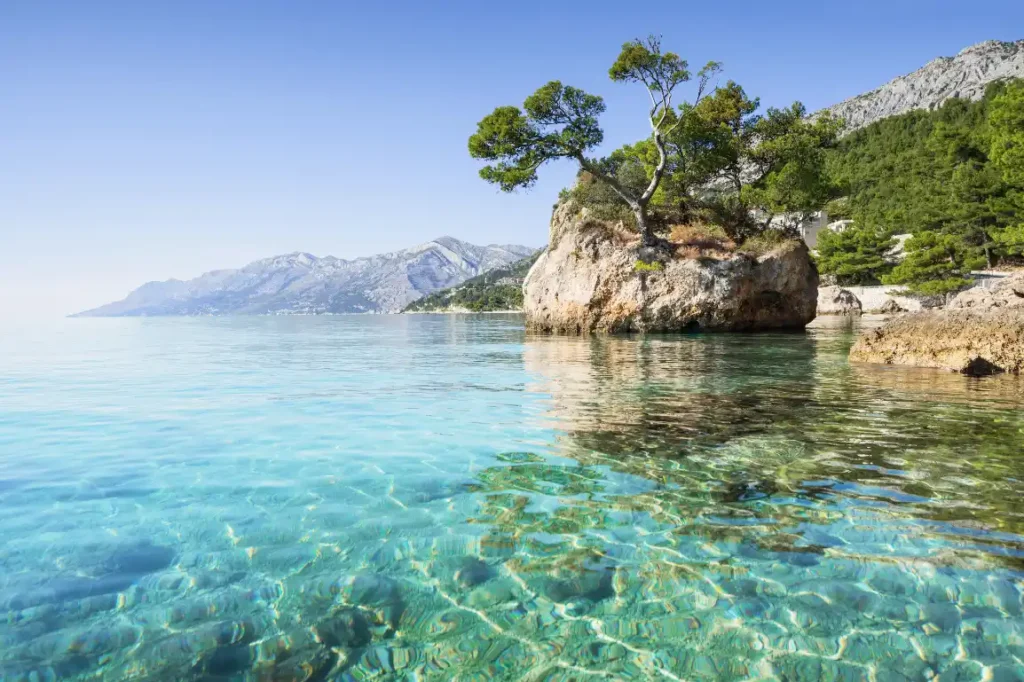Home > A Guide to Croatia Visas in 2026

A Guide to Croatia Visas in 2026
Millions of travelers head to Croatia each year. In fact, in 2024 alone, 17.3 million foreign travelers visited.
42,165 of those travelers applied for Schengen visas to travel to Croatia.
Whether you're planning a trip to explore the country, for business, or something else, the visa process can seem a bit daunting at first. Especially when it's your first time going through it.
We get it. That's why we created this guide, to help you get familiar with the process: who might need to apply, the requirements, and how to get started.
Whether or not you need a visa to go to Croatia depends on a few different things.
The three considerations are your nationality, how long you intend to stay, and why you're traveling.
Croatia is part of the Schengen area, meaning its visa rules align with Schengen visa requirements.
If you’re a citizen of a country that does not have a visa waiver agreement with the Schengen area, you will need a visa to travel to Croatia, regardless of the purpose or length of your stay.

Who is visa-exempt
If you’re from a country with a visa waiver agreement (for example, the US, Australia, the UK, etc.), you do not need a visa for stays under 90 days in length.
If you want to stay longer than 90 days, however, you will need to apply for the appropriate visa.
Lastly, if you're a citizen of an EU/EEA/Schengen country, you do not need a visa to visit Croatia.

How to apply for a Schengen visa for Croatia
There are a few steps that applicants have to take to apply for a Schengen visa for Croatia. If you've ever applied for a Schengen visa for a different country in the zone, the process is the same.
You will need to gather the required documents and book an appointment to submit your application.
Currently, in-person appointments are mandatory when applying for a Croatian visa, and they must take place in your current country of residence (which isn't necessarily you're country of nationality).
Your nationality is the country that issued your passport.
If you're a US resident, you need to apply from the States through VFS Global.
Processing times for short-term visas typically range from 10 to 15 business days.
Today, it isn't possible to apply for a Croatian visa online.
That said, in the coming years, you will be able to apply online through the official EU VAP platform. At this time, EU VAP hasn’t gone into effect yet, but it’s expected to be operational by 2030.
That said, applying for a visa through EU VAP is mostly online. There is one mandatory in-person part of the process, and that’s biometric collection, which will happen at a visa application center.

Croatia visa rejection rates
In 2024, 19.3% of Croatia visa applications were denied. Many rejections occur due to incomplete applications or insufficient proof of financial means. Keep in mind that rejection rates change regularly and also depend on a large variety of factors, including the type of visa, seasonality, and more.
Only the Croatian embassy can decide whether or not your visa is approved or denied.
Croatia Schengen visa requirements
The exact requirements depend on the specific type of visa you're applying for – whether it's for tourism, business, study, work, or something else.
However, there are basic, essential documents that you’ll likely need for any and all Croatia visa requirements, and then specific, additional needs for others.
Planning a trip to Croatia?
Don't forget about your wellbeing! Explore bestselling travel insurance today for peak peace of mind ??
Required documents
The basic documents required include:
- A completed application form.
- A recent passport-sized photo.
- A valid passport (at least 3 months beyond your intended stay, and issued in the past 10 years).
- Proof of Schengen travel insurance. The policy that you choose must meet all of the Schengen visa travel insurance requirements.
- Proof of accommodation for your stay (hotel bookings or an invitation from a host).
- Evidence of financial means to support your stay.
- A return or onward flight ticket.

Croatian travel insurance
In order to meet your visa requirements, the policy you buy must include a minimum of €30,000 in coverage for medical emergencies, hospitalization, and repatriation. It also needs to be valid in all 29 Schengen countries, not just Croatia, and for the entire length of your trip.
Make sure it meets all of the following:
- €30,000 minimum in emergency medical expenses.
- Emergency hospitalization.
- Medical evacuation.
- Repatriation of remains.
- Validity in all 29 Schengen area countries.
Do you need ETIAS with a Schengen visa for Croatia?
No, ETIAS is for visa-exempt travelers. If you're visiting Croatia with a Schengen visa, you do not need it. Learn more in our Croatia ETIAS Guide.
FAQs about Croatian visas
Sources
Schengen visa info from the Croatian government: https://mvep.gov.hr/services-consular-portal/consular-information-22802/visas-22807/issuance-procedure/applying-for-a-schengen-visa-for-croatia/262010
Data from the Croatian Bureau of Statistics: https://podaci.dzs.hr/2024/en/76896
General visa information, Croatian government: https://mvep.gov.hr/consular-information-107317-252835/general-visa-information-252837/252837
Croatia Extends Its Digital Nomad Visa
More and more employers are jumping on the "work from anywhere" trend, which is having a positive impact on workers who want to see more of the world and countries that welcome an influx of internationals.
Croatia, a pioneer when it comes to digital nomad visas, has just extended the visa allowance. Instead of travelers being limited to one year as a digital nomad, they'll be able to stay for up to 18 months.

What a Croatian Digital Nomad Visa allows you to do
Digital Nomad Visas are designed for travelers who have a work contract in their country of residence, have the ability to work remotely, and want to live abroad.
Not all countries have digital nomad visas, but Croatia does, and it is among the first wave of countries to offer this.
With Croatia's Digital Nomad Visa, you're able to live in Croatia as a legal temporary resident and work remotely.
The company that you work for must not be registered in Croatia and must not serve Croatian citizens/residents. It needs to be a foreign business/entity with a foreign customer or client base.
If approved, you'll be able to live in Croatia and work without having to pay Croatian taxes on any income earned. You can even bring your family with you, which we will talk more about in a moment.
What it doesn't allow you to do
A Digital Nomad Visa for Croatia allows you to work remotely for a foreign company, but it doesn't allow you to work in Croatia for a Croatian company.
For example, if you'd like to pick up a part-time job at a Croatian coffee shop or as an English-speaking tour guide, you won't be able to do this with a Digital Nomad visa.

Who qualifies for a Croatia Digital Nomad Visa?
Many people meet the requirements!
To apply, you need to meet the following.
- Have a work contract that allows you to work remotely in Croatia (this can include self-employment).
- Your employer/company must not be registered in Croatia, and your clients/customers must not be Croatian citizens or residents.
- You must prove that you have the funds to sustain yourself while you're living in Croatia.
How to apply for a Croatian Digital Nomad Visa
If you meet the criteria to apply for a Digital Nomad Visa in Croatia, applying is a reasonably straightforward process.
How you need to apply depends on whether or not you need a visa to visit Croatia for short tourist trips. If you don't need a visa to travel to Croatia for short trips (for example, US and UK passport holders), you can apply online or in person in Croatia (at the Embassy or relevant police station).
If you need a visa to travel to Croatia for short stays (this applies to Chinese and Indian passport holders, among others), you will need to apply abroad (in your country of residence) at the relevant Croatian Embassy/Consulate, or online.

Croatia Digital Nomad Visa application requirements
While you must meet the criteria we've already talked about in order to apply, your application will need to consist of several different documents and supporting materials. The materials must be in Croatian or English. If they're in another language, they will need to be translated with an official translator.
In your application, you'll need to include:
- If you're applying in person, you'll need to fill out this specific form, called Form 1a.
- A copy of your passport.
- Proof of health/medical insurance that covers you in Croatia for the entire duration of your stay.
- Proof that you haven't committed any criminal offenses in your home country. If you have been living abroad for more than a year before you head to Croatia, you'll need to show you haven't committed any offenses there.
- "Proof of purpose". This is proof that you have a job and can do your work remotely in Croatia. It's also proof that your employer/business is not a Croatian one. You'll need to show your work contract, as well as an official letter/statement from your employer.
- Proof of means of subsistence (i.e., proof that you can financially support yourself in Croatia). As of September 2025, the monthly required amount is 3,295.00 euros. Make sure you check the latest numbers with the Croatian Embassy, as they can change. Your financial documents must clearly show which currency they are in.
You need to show proof through one of the following:
- Your intended address in Croatia (where you're going to be staying).
Once your visa is approved, there will be a few more steps you need to take once you arrive in Croatia.

Traveling with your family/partner
If you want to bring your partner, spouse, and/or children with you, it is possible!
Close family members can apply for a temporary family reunification visa.
If you are in a long-term relationship, but unmarried, your partner can apply so long as you have been together a minimum of 3 years (without children), or shorter if you do have children together.
FAQs: Croatian Digital Nomad Visa
Sources
Croatian Republic of Interior: Digital Nomad Info: https://mup.gov.hr/aliens-281621/stay-and-work/temporary-stay-of-digital-nomads/286833
Croatia's digital nomad visa application platform: https://digitalnomadscroatia.mup.hr/Pages/Zahtjev2
